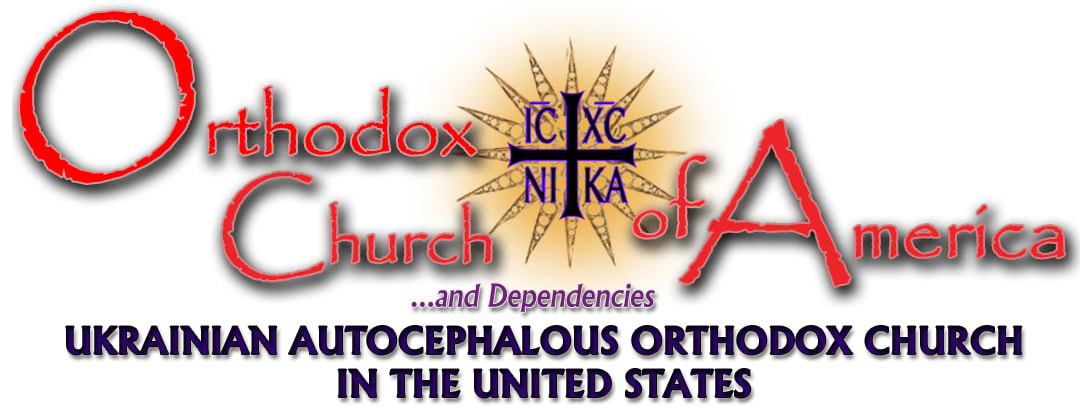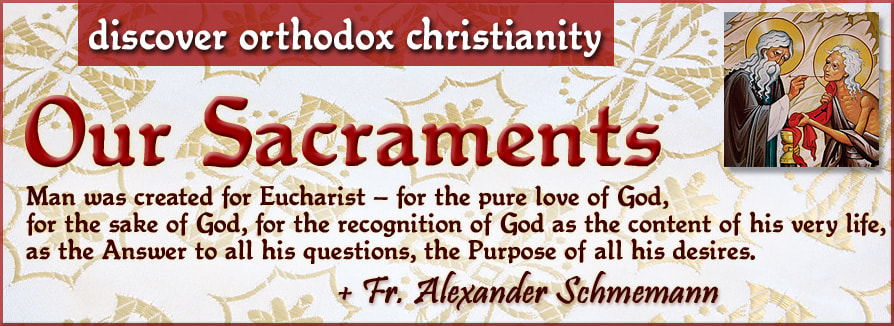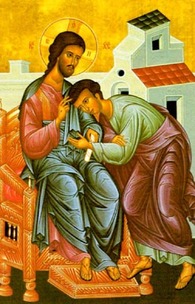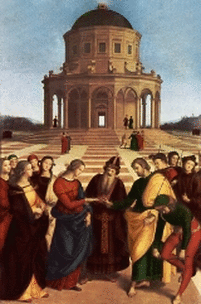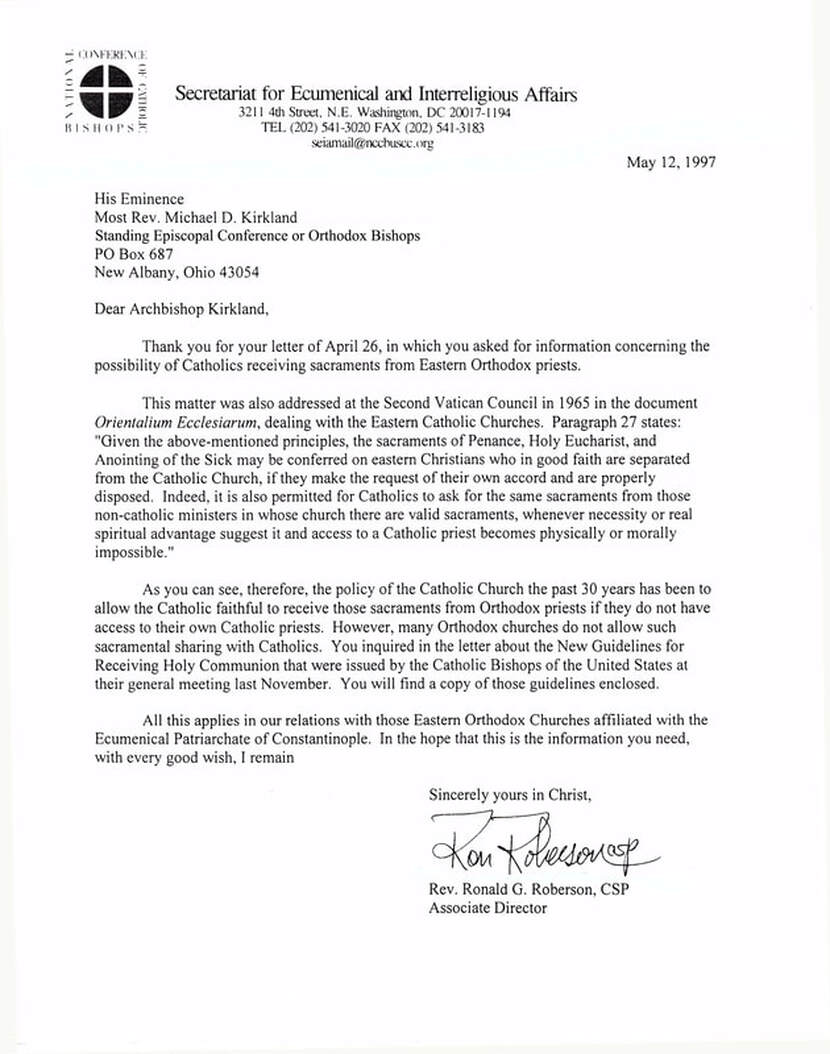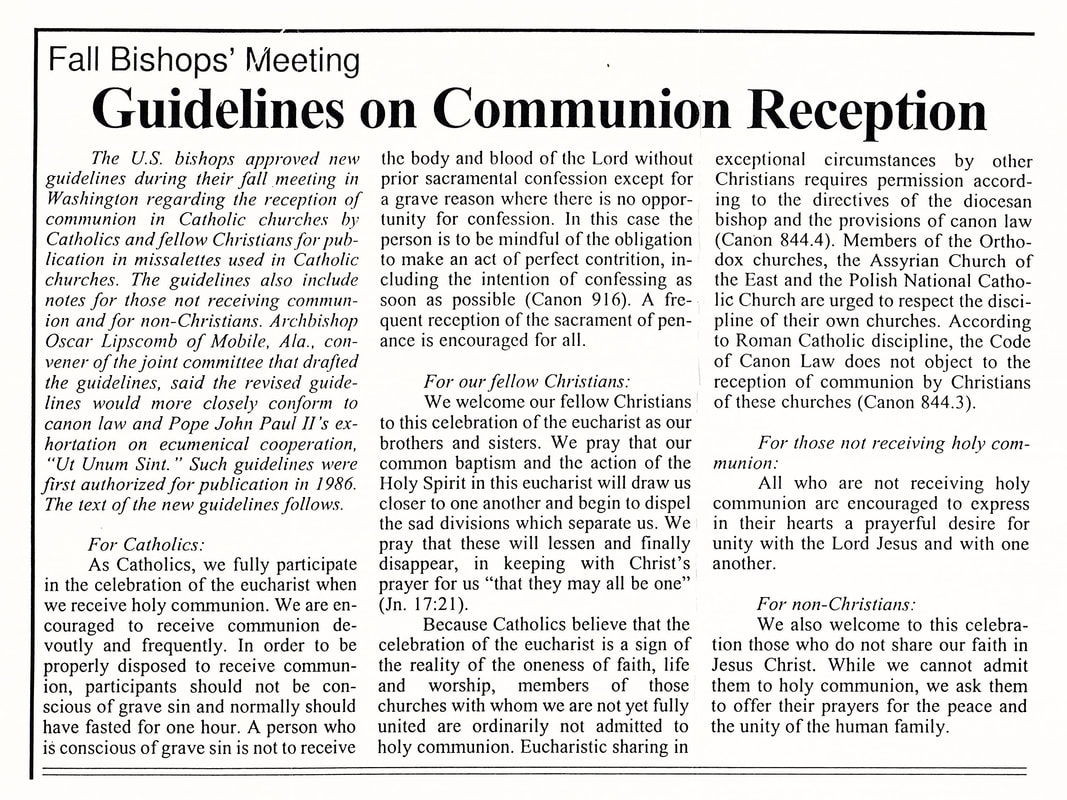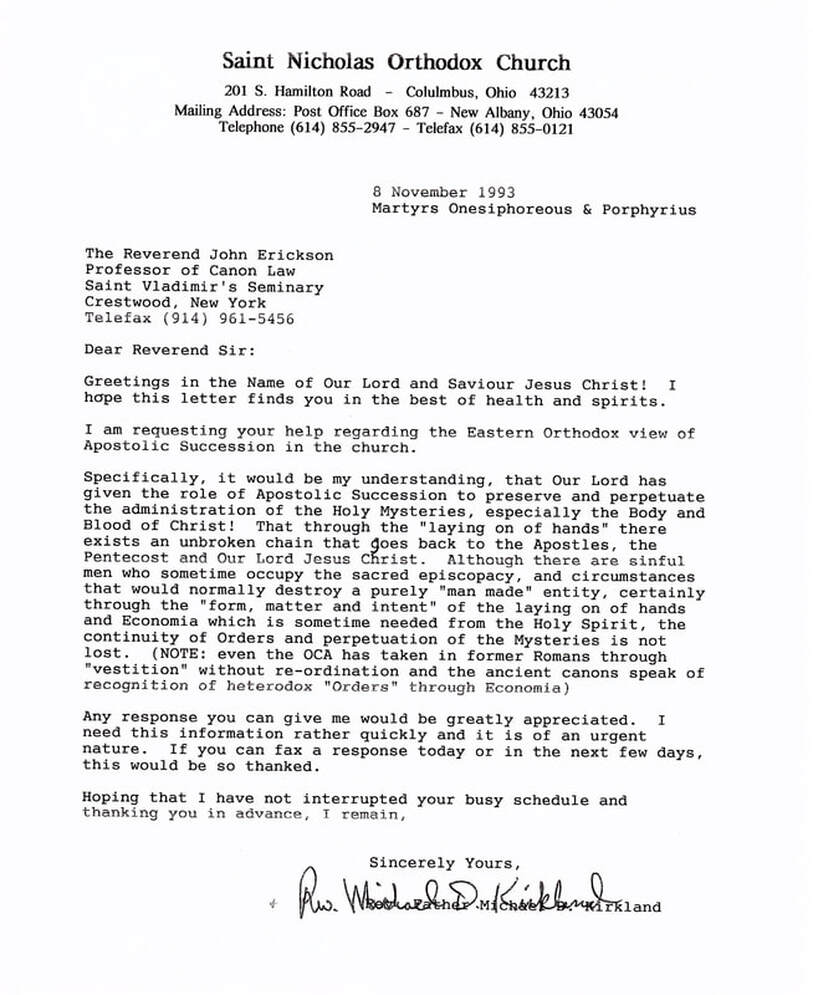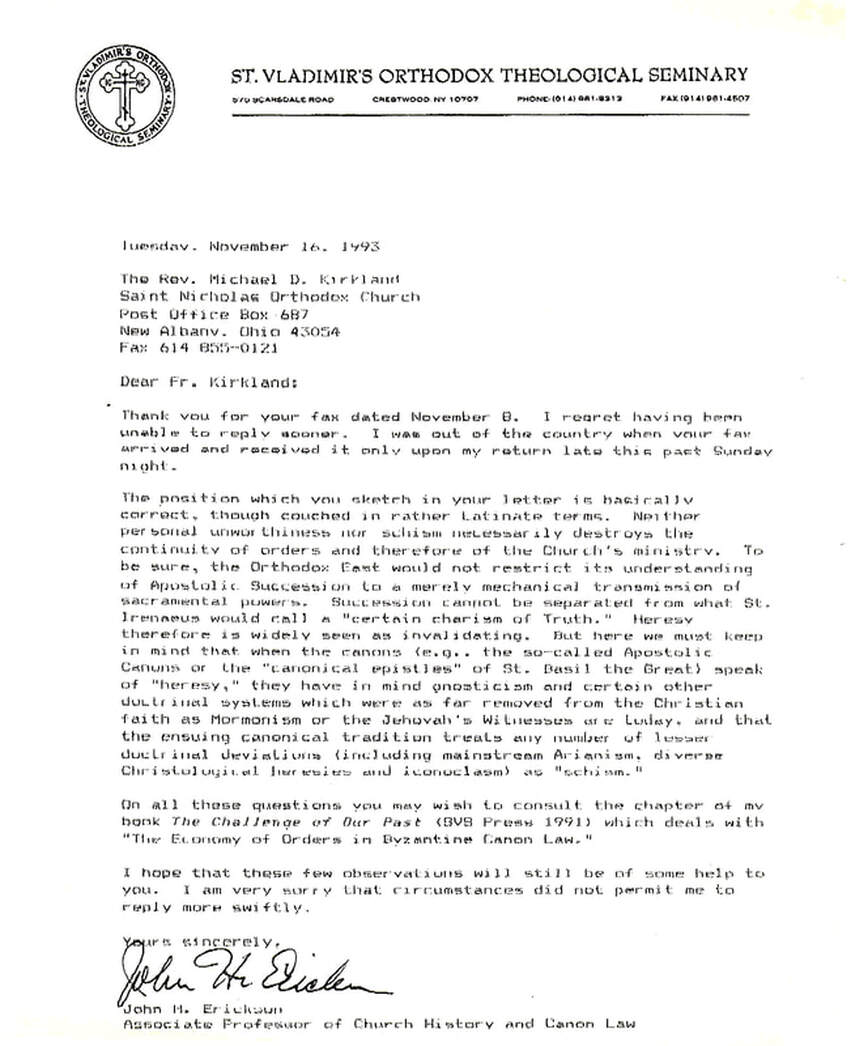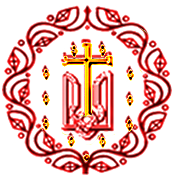"Holy Mysteries" in the Orthodox Christian Church
(Reception of Orthodox Sacraments by Roman Catholics and Orthodox Christians from Roman Catholics - See Official Guidelines Below)
(Reception of Orthodox Sacraments by Roman Catholics and Orthodox Christians from Roman Catholics - See Official Guidelines Below)
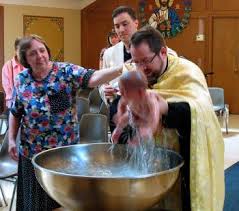
HOLY BAPTISM
First place among the Sacraments of the Orthodox Church is Holy Baptism, by which a man, who has come to believe in Christ, by being immersed three times in water in the Name of the Holy Trinity (Father, Son and Holy Spirit) is cleansed through Divine Grace of all sins (Original Sins and personal) sins) and is reborn into a new holy, and spiritual life. Baptism serves as the door through which man enters into the House of Eternal Wisdom - the Church - for, without it, a man cannot be united completely with the Saviour, become a member of His Church, receive other Sacraments, and be the heir to Eternal Life. As the Lord Himself said, in His discourse with Nicodemus, "Truly, truly, I say to you, unless one is born of water and the Spirit, he cannot enter the Kingdom of God." (St. John 3:5) (MORE ON THE "MYSTERY" OF THE SACRAMENTS) |
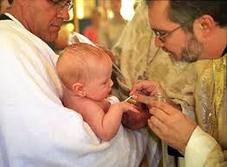
HOLY CHRISMATION
(Confirmation) In the Sacrament of Baptism man is called out of spiritual darkness into the light of Christ and is initiated into the economy of salvation by the Son of God. This initiation is effected, however, in the Sacrament of Holy Chrismation. "Repent, and be baptized every one of you in the Name of Jesus Christ," the Apostle Peter preached to the people on Pentecost, "and you shall receive the gift of the Holy Spirit." (Acts 2:38) Since that time the Divine Gift of the Holy Spirit is bestowed upon each person who rises from the baptismal font. And everything the Holy Spirit touches receives the seal of an invaluable treasure, a ray of eternal light, the reflection of Divine action. It awakens in the soul that inner, spiritual thirst to grow toward the Heavenly, to the eternal and to the perfect as Temples of the Holy Spirit. (MORE ON THE "MYSTERY" OF HOLY CHRISMATION) |
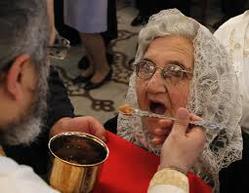
HOLY EUCHARIST
(Holy Communion) The central place among the Sacraments of the Orthodox Church is held by the Holy Eucharist - the Precious Body and Blood of our Lord, God and Saviour Jesus Christ. The Saviour Himself said, "I am the Bread of Life; he who comes to Me shall not hunger, and he who believes in Me shall never thirst...If anyone eats of this Bread he will live forever; and the Bread which I shall give for the life of the world is My flesh." (St. John 6:35,51) At the Last Supper, "Jesus took bread, and blessed, and broke it, and gave it to the disciples and said, 'Take, eat; this is My Body.' And He took a cup, and when He had given thanks He gave it to them, saying, 'Drink of it, all of you; for this is My Blood of the new covenant, which is poured out for many for the forgiveness of sins.' " (St. Matthew 26:26-28; cf. St. Mark 14:12-16; St. Luke 22:7-13; 1 Corinthians 11:23-30.) (MORE ON THE "MYSTERY" OF THE HOLY EUCHARIST BY THE EARLY CHURCH FATHERS) |
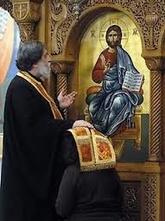
HOLY REPENTANCE
(Penance Confession) The Sacrament of Repentance developed early in the Church's history in the time of persecutions of the 3rd and 4th Centuries, when many people, giving to the threats of persecutors, apostasized and fell away from the Church. Apostacy was considered to be a very serious sin; many held the extreme position that such could not be received back into the Church in their lfetime, while others held that those who had lapsed should be re-baptized - that is, their sins should be washed away by a second baptism. Moderation, in the course of time, prevailed and a penitential discipline - the Sacrament of Repentance - developed, taking on the meaning of Second Baptism. In the Sacrament, the Priest is "only the witness" and pronounces the absolution. "If we confess our sins, [God] is faithful and just, and will forgive our sins and cleanse us from all unrighteousness." (St. John 1:9) (MORE ON THE "MYSTERY" OF THE HOLY EUCHARIST) |
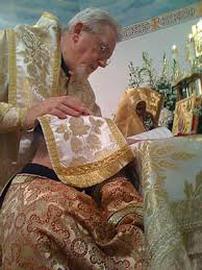
HOLY
ORDERS (Ordination) In the Orthodox Church there are to be found three "Major Orders" - Bishop, Priest and Deacon - and two "Minor Orders" - Subdeacon and Reader. The Holy Apostles appointed seven men (Church Tradition calls them "Deacons') to perform a special serving ministry (Acts 6:2-6) and in his first letter to the Corinthians, St. Paul speaks of various ministries in the Church (1 Cor. 12:28). Likewise, he address his Letter to the Philippians, "To all the saints in Christ Jesus who are at Philippi, with the bishops and deacons" (Phil. 1:1}. In his first Letter to Timothy, the Holy Apostle also speaks of the qualifications of Bishops and Deacons (1 Tim. 3:1-13), as well as in his Letter to Titus (1.5-9). Ordinations are accomplished by the Laying-on of Hands and intercession of the Holy Spirit. Bishops and Priests must be men. From Apostolic Times, as witnessed in Sacred Scripture and in the Ordination Rites of the Great Church of Constantinople, men and women have been ordained as Deacons. Being married has never been an impediment to the reception of Holy Orders. (MORE ON A FAMILY'S JOURNEY TO THE PRIESTHOOD) |
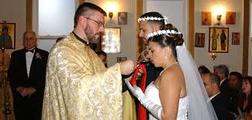
HOLY MATRIMONY
(Marriage) In the theology of the Orthodox Church man is made in the Image of the Most-holy Trinity, and, except in certain special cases (such as the calling to monasticism), he is not intended by God to live alone, but in a family situation. Just as Almighty God blessed the first humans, Adam and Eve, to live as a family, to be fruitful and multiply, so too the Church blesses the union of man and woman. Marriage is a state of Grace requiring a gift or charism from the Holy Spirit - this give being conferred in the Sacrament of Holy Matrimony. Holy Matrimony has divine sanctions from the words of the Lord Himself, Who says: "Have you not read that He Who made them from the beginning made them male and female, and said, 'For this reason a man shall leave his father and mother and be joined to his wife, and the two shall become one flesh' (Genesis 2:24)? "So then are no longer two but one flesh. What therefore God has jointed together, let not man put asunder." (St. Matthew 19:5-6) Although marriage is indissoluble, if it has "ceased to be a reality" and there is a divorce, the Church does not insist on the preservation of a legal fiction and will help men and women rise again after the fall and permit a second or third marriage. SEE ARTICLE BELOW REGARDING DIVORCE & REMARRIAGE IN THE HOLY ORTHODOX CHURCH (MORE ON THE "MYSTERY" OF MARRIAGE) |
Marriage, Divorce and Remarriage in the Orthodox Church!
Unlike many Christian Churches which hold that the bride and bridegroom execute the marriage themselves, in their vows to each other, in the Orthodox Church it is the priest or the bishop who consecrates the marriage, who calls upon God in the name of the community, and asks that the Holy Spirit be sent down on this man and this woman to make them “into one flesh." Marriage is a spiritual path, a seeking after God in oneness and love...and not just a necessity for reproduction.
Marriage is a mystery instituted with God’s blessing during creation. Christ says: “But at the beginning of creation God ‘made them male and female.' For this reason a man will leave his father and mother and be united to his wife, and two will become one flesh." (St. Mark 10, 6-8).
Therefore, the purpose of marriage is the reciprocal love, the relationship and the help between the marriage partners with view to their completion in Christ. The Early Church says this: “There are two reasons for which marriage was established …(1) to cause the man to be satisfied with one single wife and (2) to give him children...but it is the first which is the most important…As for reproduction, marriage does not necessarily include this…in many marriages having children is not possible...”
We must also understand that divorce is a sin...it kills a marriage; but, the Orthodox Church permits divorce and remarriage on the grounds of interpretation of what the Lord says in St. Matthew: “I tell you that anyone who divorces his wife, except for marital unfaithfulness, and marries another woman commits adultery." According to the Church, the granting of divorce is an “expression of compassion” toward sinful man. “Since Christ allowed an exception to His general ruling about the indissolubility of marriage...the Orthodox Church also is willing to allow an exception."
Did Christ consider marriage to be indissoluble? We need to be very clear in this as when Christ teaches that marriage may not be dissolved...that does not mean that He is stating that divorce or dissolution cannot occur. We know the completeness of the marriage relationship can be tainted by erroneous behaviour. As the Early Church taught: “It is not the letters of divorce that dissolve the marriage in relation to God...but the errant behaviour."
According to the spirit of Orthodox Christianity, the unity of the married couple cannot be maintained through the virtue of a legal obligation alone; the formal unity must be consistent with an internal symphony. The problem arises when it’s no longer possible to salvage anything of this symphony, for “then, the bond that was originally considered indissoluble...is already dissolve...and the law (that Marriage License) can offer nothing to replace grace...and can neither heal nor resurrect, nor say: ‘Stand up and go.’”
This is where the Church recognizes that there are cases in which married life has no content or may even lead to loss of the soul. Our Holy Fathers say in this regard that it is: “better to break the covenant than to lose one’s soul."
The Orthodox Church sees divorce as a tragedy due to human weakness and sin...but, despite the fact that the Church condemns sin, she also desires to be an aid to those who suffer and for whom she may allow another marriage. This is certainly the case when the marriage has ceased to be a reality. Another marriage is therefore only permitted because of “human weakness." As the apostle St. Paul says concerning the unmarried and widows: “If they can not control themselves, they should marry” (1 Cor. 7, 9). Remarriage is permitted as a pastoral concession in the context of the Church’s “expression of compassion,” it is an answer to the human weakness and the corrupt world in which we live. The Church cannot turn Her back on Her children...She is there to forgive, comfort and love.
This pastoral concession is an image of the divine love and kindness of Almighty God! The Church, which continues to extend Christ’s redeeming work in the world, has on the basis of the Lord’s commandments, and of the Apostles, always holds in mind what the Lord Himself has said: “The Sabbath is made for man, and not man for the Sabbath” (St. Mark 2, 27).
Pastoral concession is based on Christ’s command to his apostles: “Receive the Holy Spirit. If you forgive anyone his sins, they are forgiven” (St. John 20, 22-23). And, nowhere does Christ or Holy Scripture say that divorce is an unforgivable sin! This IS the case when the human marriage experience becomes impossible, due to the spiritual death of love. It is then that the Church – as the Body of Christ – with understanding and compassion and out of personal concern can “accept the divorce and not reject the sinful humanly weak believers, or deprive this man or this woman from God’s mercy and further grace.” This is the precise goal of pastoral concession - that the weak person not be irrevocably banned from the church communion, according to Christ’s example, who came, after all, to save the lost.
In conclusion, the Orthodox Church’s perspective on divorce and remarriage, is steeped in wisdom and in applying the unconditional love as exampled by Our Blessed Lord. We confirm the indissolubility of a true & valid Christian marriage...but...NOT the downright irrevocable preservation of a legal affirmation. The Orthodox Church and our Ukrainian jurisdiction refuses to shut the door of Christ’s mercy, but holds still, to the teaching of the New Testament....and, therefore....YOU ARE FORGIVEN...
Unlike many Christian Churches which hold that the bride and bridegroom execute the marriage themselves, in their vows to each other, in the Orthodox Church it is the priest or the bishop who consecrates the marriage, who calls upon God in the name of the community, and asks that the Holy Spirit be sent down on this man and this woman to make them “into one flesh." Marriage is a spiritual path, a seeking after God in oneness and love...and not just a necessity for reproduction.
Marriage is a mystery instituted with God’s blessing during creation. Christ says: “But at the beginning of creation God ‘made them male and female.' For this reason a man will leave his father and mother and be united to his wife, and two will become one flesh." (St. Mark 10, 6-8).
Therefore, the purpose of marriage is the reciprocal love, the relationship and the help between the marriage partners with view to their completion in Christ. The Early Church says this: “There are two reasons for which marriage was established …(1) to cause the man to be satisfied with one single wife and (2) to give him children...but it is the first which is the most important…As for reproduction, marriage does not necessarily include this…in many marriages having children is not possible...”
We must also understand that divorce is a sin...it kills a marriage; but, the Orthodox Church permits divorce and remarriage on the grounds of interpretation of what the Lord says in St. Matthew: “I tell you that anyone who divorces his wife, except for marital unfaithfulness, and marries another woman commits adultery." According to the Church, the granting of divorce is an “expression of compassion” toward sinful man. “Since Christ allowed an exception to His general ruling about the indissolubility of marriage...the Orthodox Church also is willing to allow an exception."
Did Christ consider marriage to be indissoluble? We need to be very clear in this as when Christ teaches that marriage may not be dissolved...that does not mean that He is stating that divorce or dissolution cannot occur. We know the completeness of the marriage relationship can be tainted by erroneous behaviour. As the Early Church taught: “It is not the letters of divorce that dissolve the marriage in relation to God...but the errant behaviour."
According to the spirit of Orthodox Christianity, the unity of the married couple cannot be maintained through the virtue of a legal obligation alone; the formal unity must be consistent with an internal symphony. The problem arises when it’s no longer possible to salvage anything of this symphony, for “then, the bond that was originally considered indissoluble...is already dissolve...and the law (that Marriage License) can offer nothing to replace grace...and can neither heal nor resurrect, nor say: ‘Stand up and go.’”
This is where the Church recognizes that there are cases in which married life has no content or may even lead to loss of the soul. Our Holy Fathers say in this regard that it is: “better to break the covenant than to lose one’s soul."
The Orthodox Church sees divorce as a tragedy due to human weakness and sin...but, despite the fact that the Church condemns sin, she also desires to be an aid to those who suffer and for whom she may allow another marriage. This is certainly the case when the marriage has ceased to be a reality. Another marriage is therefore only permitted because of “human weakness." As the apostle St. Paul says concerning the unmarried and widows: “If they can not control themselves, they should marry” (1 Cor. 7, 9). Remarriage is permitted as a pastoral concession in the context of the Church’s “expression of compassion,” it is an answer to the human weakness and the corrupt world in which we live. The Church cannot turn Her back on Her children...She is there to forgive, comfort and love.
This pastoral concession is an image of the divine love and kindness of Almighty God! The Church, which continues to extend Christ’s redeeming work in the world, has on the basis of the Lord’s commandments, and of the Apostles, always holds in mind what the Lord Himself has said: “The Sabbath is made for man, and not man for the Sabbath” (St. Mark 2, 27).
Pastoral concession is based on Christ’s command to his apostles: “Receive the Holy Spirit. If you forgive anyone his sins, they are forgiven” (St. John 20, 22-23). And, nowhere does Christ or Holy Scripture say that divorce is an unforgivable sin! This IS the case when the human marriage experience becomes impossible, due to the spiritual death of love. It is then that the Church – as the Body of Christ – with understanding and compassion and out of personal concern can “accept the divorce and not reject the sinful humanly weak believers, or deprive this man or this woman from God’s mercy and further grace.” This is the precise goal of pastoral concession - that the weak person not be irrevocably banned from the church communion, according to Christ’s example, who came, after all, to save the lost.
In conclusion, the Orthodox Church’s perspective on divorce and remarriage, is steeped in wisdom and in applying the unconditional love as exampled by Our Blessed Lord. We confirm the indissolubility of a true & valid Christian marriage...but...NOT the downright irrevocable preservation of a legal affirmation. The Orthodox Church and our Ukrainian jurisdiction refuses to shut the door of Christ’s mercy, but holds still, to the teaching of the New Testament....and, therefore....YOU ARE FORGIVEN...
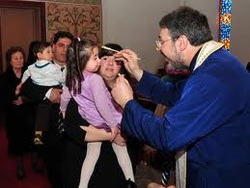
HOLY UNCTION (Anointing of the Sick)
This Sacrament is described in Holy Scripture by St. James the Brother of the Lord: "Is any among you sick? Let him call for the elders of the Church, and let them pray over him, anointing him with oil in the name of the Lord; and the prayer of faith will save the sick man, and the Lord will raise him up; and if he has committed sins, he will be forgiven." (St. James 5:14-15) From the text, we can see that this Sacrament has a twofold purpose - bodily healing and the forgiveness of sins. The two are joined, for man is a unity of body and soul and there can be no sharp distinction between bodily and spiritual sickness. Of course, the Church does not believe that this anointing is automatically or magically followed by recovery of health, for God's will and not man's prevails in all instances. Sometimes the sick person is healed and recovers after receiving the Sacrament, but in other cases he does not recover, but the Sacrament, nonetheless, gives him the spiritual strength to prepare for death. We must note that this Sacrament is NOT only for those on their deathbed, but for anyone who is sick. It may also be performed over the healthy as well (as is the custom on Holy Wednesday) and in some traditions it is often performed over the healthy before Holy Communion, since the rite also contains elements of repentance, although it should be noted that this does not replace the Sacrament of Penance. (MORE ON THE "MYSTERY")
(NOTE: excerpts about the Holy Sacraments are taken from THESE TRUTHS WE HOLD, Copyright 1986 by St. Tikhon's Seminary Press. Graphics courtesy of the Antiochian Orthodox Archdiocese of North America.)
This Sacrament is described in Holy Scripture by St. James the Brother of the Lord: "Is any among you sick? Let him call for the elders of the Church, and let them pray over him, anointing him with oil in the name of the Lord; and the prayer of faith will save the sick man, and the Lord will raise him up; and if he has committed sins, he will be forgiven." (St. James 5:14-15) From the text, we can see that this Sacrament has a twofold purpose - bodily healing and the forgiveness of sins. The two are joined, for man is a unity of body and soul and there can be no sharp distinction between bodily and spiritual sickness. Of course, the Church does not believe that this anointing is automatically or magically followed by recovery of health, for God's will and not man's prevails in all instances. Sometimes the sick person is healed and recovers after receiving the Sacrament, but in other cases he does not recover, but the Sacrament, nonetheless, gives him the spiritual strength to prepare for death. We must note that this Sacrament is NOT only for those on their deathbed, but for anyone who is sick. It may also be performed over the healthy as well (as is the custom on Holy Wednesday) and in some traditions it is often performed over the healthy before Holy Communion, since the rite also contains elements of repentance, although it should be noted that this does not replace the Sacrament of Penance. (MORE ON THE "MYSTERY")
(NOTE: excerpts about the Holy Sacraments are taken from THESE TRUTHS WE HOLD, Copyright 1986 by St. Tikhon's Seminary Press. Graphics courtesy of the Antiochian Orthodox Archdiocese of North America.)
We wanted to know the "Official" stand of the Roman Catholic Church
and their understanding of Orthodox Orders and the reception of Sacraments:
NOTE: The Orthodox Church of America follows the example
of Jesus Christ...Our Lord never turned anyone away...... "with fear and love draw ye near"...
of Jesus Christ...Our Lord never turned anyone away...... "with fear and love draw ye near"...
We wanted to know the "Official" Orthodox view of Apostolic Succession
~ and, subsequently the validity of Orthodox Sacraments ~
should a Deacon, Priest or Bishop be in sin or his/our Orders being in question:
NOTE: The Orthodox Church of America continues to safeguard
our precious "gift" of Holy Orders and the Valid Apostolic Succession.
...we freely give what has been freely given to us...
our precious "gift" of Holy Orders and the Valid Apostolic Succession.
...we freely give what has been freely given to us...

